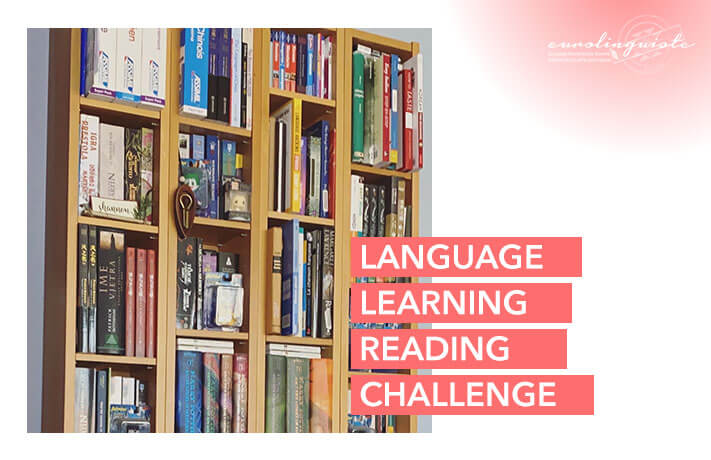12 Signs You Aren’t Getting the Most Out of Your Language Studies

My name is Shannon Kennedy and I'm the language lover,…
You might not be productive in your language learning if…
1. You aren’t studying between language lessons.
If you’re showing up to your lessons, great job. Still, if you’re not doing any study or independent work in-between, you are not being a good language student. It may seem like taking lessons is enough, but it isn’t. A teacher can help you work through your language learning struggles by providing their expertise, but they can’t do the work for you. And you need to do the work to learn the language.
2. You have a bunch of resources that are collecting dust on the shelves.
Just because you own the book doesn’t mean that you’ll learn what’s in it. Unless you pick it up off the shelf, crack it open and work through it from cover to cover (don’t worry it’s okay to skip the parts that aren’t relevant to you), then it serves no purpose being there. Plus, it will only make you feel guilty when you glance over, see it and realize that you’ve never used it. That guilt isn’t very conducive to a positive language learning environment.
3. You have a bunch of digital resources that are collecting digital dust.
Like physical resources, digital resources are meant to be used. Don’t get sucked into hoarding resource files or website bookmarks if you don’t plan to use them. Having them doesn’t mean you’ll learn the language. It’s a great start, but again they need to be used.
4. You’re paying monthly subscriptions for language products that you don’t actually use.
I was guilty of this at one point. I heard ‘spending money on something is a good way to stay accountable’ and it made sense to me. So I paid for subscriptions to language products and podcasts… that I never used. If you’ve invested in language resources, make sure you use them. Otherwise, cancel your subscriptions. Again. It’s just another way to feel guilty and tie negative emotions to something that should be a positive experience.
5. Your resources dictate what you learn.
Relying on a resource to teach the language is one of the biggest mistakes I see language learners make. A resource is something that you use as a part of your language learning journey. It isn’t going to teach you everything that you need to know and it doesn’t know what’s best for you (it is a predefined, set resource). It’s up to you to take what you need from it and then look elsewhere for what’s missing. Don’t spend time learning vocabulary you’ll never use just because it’s the next chapter in your book. Be more proactive in seeking out material that actually helps you reach your specific goals in your language. Which brings me to my next point…
6. You aren’t planning for the future / You don’t have a goal you’re reaching towards.
Goals are so important when it comes to learning a language. They not only mark what you’re aiming for, but they help you build the path you’ll need to take to get there. If you haven’t already spent the time to figure out why you’re learning a language, your studies aren’t going to be productive. When you don’t have a purpose, you’re just going with the motions. A purpose gives you a direction and you can then start along the route that will get you there (even if you make a wrong turn here or there).
7. You’re not motivated.
I’m going to be honest. Language learning takes time and dedication. And even if you stick with it, you won’t always feel motivated to sit down and study. But if you never feel motivated to do the work, then it may be time to re-evaluate.
8. You dread the time you know you should sit down and study.
Do you hate the process of learning a language? You should probably take a look at the strategies you’re using and make a few changes. Language learning doesn’t need to be just rote learning or textbook study. There are things that you can do that implement into your day more naturally and others that you can do that are – dare I say – enjoyable.
Try changing things up. Play games in your language. Read the kinds of books or articles you’d normally enjoy in your native language. Watch a tv series or a movie. Listen to music. Find a class taught in the language (online or in-person). There are a lot of ways you can learn a language outside of the ‘traditional’ methods.
9. You tell yourself you won’t learn the language because you don’t have enough time/don’t have the language gene/are too old/don’t have enough money/can’t travel to the country.
It’s easy to feel intimidating by the challenge of learning a new language. It can seem like this immense project that is impossible to tackle. So instead of facing it head on, you make excuses for why you probably, maybe won’t be able to do it. But really, the only reason you won’t learn a language is because you’ve put up mental blocks. Not because you don’t have enough time/don’t have the language gene/are too old/don’t have enough money/can’t travel to the country.
10. You aren’t making progress. You feel like you’ve been stuck at the same level in your language for months, or even years.
Plateaus are tough, but that doesn’t mean breaking through them is impossible. Sometimes plateaus are the result of doing too much of the same thing. Yeah, your system may work for you – in general – but if you feel like you aren’t making any real progress, you may need to try something else. Try using a resource that’s completely different from what you’d normally do and see how it goes.
11. You don’t study as much as you’d like.
If you’re waiting for that one hour, or even thirty minute, chunk of time to open up in your schedule, then you’re probably not studying as much as you’d like. Because, as I’m sure you’ve figured out, that solid, uninterrupted chunk of time rarely comes up days (and sometimes even weeks) go by without you getting the chance to sit down and study.
Instead, try reframing how you schedule your study sessions. Do 10 minutes of vocabulary study in the morning, listen to a 15 minute podcast on your way to work, then spend 15 minutes working through your course book in the evening. Even five minutes here or there adds up. If you break your study time up into shorter blocks of time throughout the day, you’ll find you can easily get more than an hour of study in a day.
12. You’ve read this post and one of the points made you feel uncomfortable, defensive, angry, or guilty.
Having unproductive periods when it comes to language learning is okay. But not having a plan to breakthrough those periods is not okay. If you are serious about tackling a language.
Yes, we all have lives outside of our language studies, but that doesn’t mean you can constantly excuse yourself for not doing the work. Sometimes it’s a matter of circumstance, but more often than not, we are at fault.
We’ve all been unproductive at different points in our lives – I’ve been guilty of almost everything on this list myself at some time. But I’ve done my best to be more deliberate in both my planning and my study time and my progress has been greatly rewarded by those efforts.
What about you?
Do any of these resound with you? Is there something I may have missed?
I’d love to hear your thoughts in the comments.
What's Your Reaction?
My name is Shannon Kennedy and I'm the language lover, traveler, and foodie behind Eurolinguiste. I'm also the Resident Polyglot at Drops and the Head Coach of the Fluent in 3 Months Challenge.





